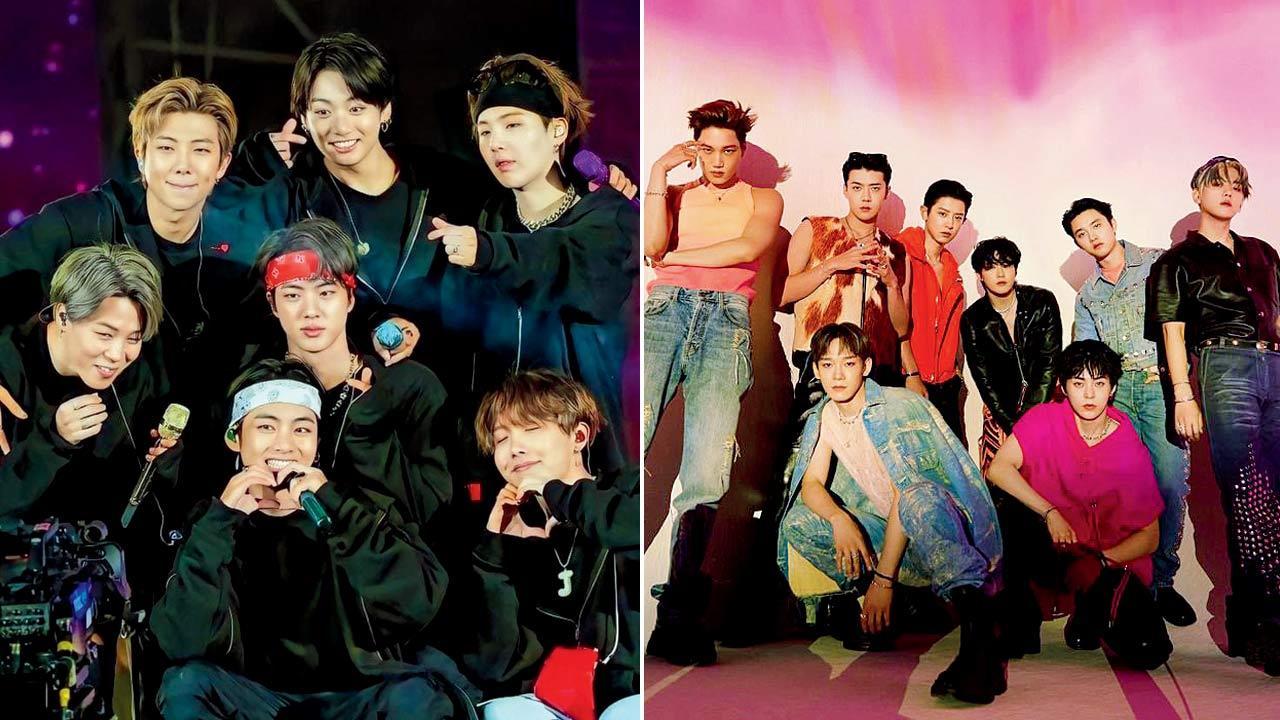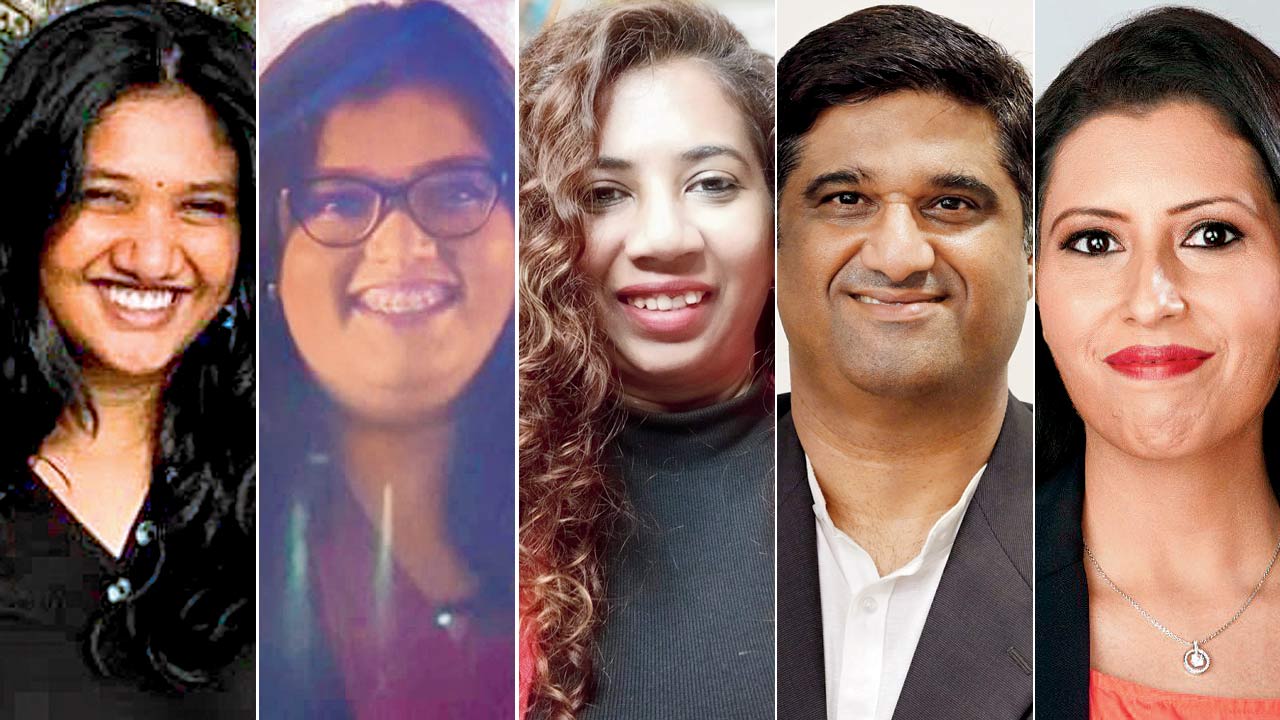Last week, in Maharashtra’s Dharashiv district, three teenage girls staged their own kidnapping to allegedly fund a trip to South Korea to meet K-pop group BTS. What’s driving such insane fandom?

Three teenage girls hailing from Maharashtra’s Dharashiv district staged their own kidnapping to fund a journey to South Korea in hopes of meeting members of boy band BTS. (right) Three members from K-POP boy band EXO—Suho, Chen and Xiumin performed in Mumbai in 2024 at different K-festivals. Pics/Pinterest
Talk about having a crush! In an incident that took place this week in Maharashtra, three teenage girls—two aged 13 and one just 11, hailing from the state’s Dharashiv district—allegedly staged their own kidnapping to fund a journey to South Korea in hopes of meeting members of the globally renowned boy band BTS.
The police tracked the minors to a state transport bus headed to Pune, where they had planned to find work and save up to fund their dream trip. Earlier in 2024, three teenage girls from Tamil Nadu attempted a similar stunt, pooling together '14,000 to travel to South Korea. It would seem that K-pop fever has finally infiltrated even small towns in India.
The Korean pop industry, often referred to as K-pop, is not just a music genre; it’s a meticulously engineered cultural phenomenon. Groups like BTS, Blackpink, EXO and so many more, are not only celebrated for their music but are also idolised as perfect personas, embodying unattainable beauty, charm, and talent. This perfection is no accident—behind every idol is a massive machinery of management companies. Hallyu, which is more commonly known as the K-wave, has swept across India in the last couple of years. K-dramas like Squid Games and Crash Landing on You have gained massive fan bases, K-beauty products are sold out everywhere, and of course, K-pop is bigger than ever. Members of EXO including Suho, Xiumin and Chen, GOT 7’s BamBam, and soloist B.I., who are some of the K-pop industries biggest names, recently performed in different K-festivals in Mumbai.
For many fans, especially teenagers, K-pop idols are more than entertainers; they are role models, emotional anchors, and even pseudo-friends. Nirali Bhatia, a Cyber psychologist and psychotherapist and the founder of CyberBAAP which is an organisation that works to counter cyberbullying, has the last word when she explains, “It is important to understand that the internet is nothing but an overflow of content and this creates a rather distorted sense of attachment with who you see online.”
 Nandana Ramesh, Siddhi Bhasin, Nirali Bhatia, Ritesh Bhatia and Dr Havovi Bhagwagar
Nandana Ramesh, Siddhi Bhasin, Nirali Bhatia, Ritesh Bhatia and Dr Havovi Bhagwagar
“Teenagers are in a unique phase of life where they are trying to figure out who they are, and in that process, they look for role models to emulate. Their brains are wired to be highly sensitive to emotional connections, which is why these attachments can feel so intense,” explains Dr Hvovi Bhagwagar, a Mumbai-based psychologist and psychotherapist. “At this stage, the brain’s limbic system, which controls emotions and impulses, is over-active, making emotional highs (like excitement over a K-pop idol) feel intensely rewarding. However, the pre-frontal cortex (the part of the brain responsible for mature reasoning and impulse control), is still underdeveloped. This imbalance means they may struggle to think critically or set boundaries, so their emotional attachment to a celebrity can easily spiral into an obsession.”
The financial commitment of K-pop fans is another telling aspect of the culture. Siddhi Bhasin, a criminology student and K-pop fan, explains, “It’s common for fans to buy multiple copies of the same album to support their idols. This boosts album sales, improves chart rankings, and increases their chances of winning a ticket to exclusive fan events.” It stems from intense love, but the financial burden on fans, particularly teenagers, can strain families and lead to unhealthy spending habits. Bhasin also recalls her experiences on Twitter, where fandom wars often escalated into harassment. “I’ve seen people receive death threats for criticizing a group. It’s toxic and takes away from the joy of being a fan.”
Veteran fans like Nandana Ramesh, who has been following K-pop since 2016, lament the shift in focus from music to appearances. “Back then, it was all about the music that our most loved idols were coming out with. Quirky fashion choices and unhinged music videos was what K-pop was all about! Now, it’s more about the idols’ looks. Talent often takes a backseat, which is disappointing,” she sighs.
The question then arises: who is responsible for preventing such incidents? Cybercrime investigator Ritesh Bhatia highlights the role of parents and educators in monitoring adolescent behaviour. “Parents need to look out for red flags, like withdrawal from other interests or distress when asked to step away from their screens. Educators, too, must emphasize the importance of cybersecurity and critical thinking.”
However, the onus doesn’t rest solely on families and schools. Bhatia believes the stars’ managers also have a role to play. “These companies profit immensely from their idols’ popularity. Hence, they should invest in monitoring online fan communities and issuing regular advisories to warn fans.”
Bhatia explains that this incident could have unfolded in various ways. He highlights the risks associated with online fan communities on social media, where anonymity makes it difficult to verify users’ identities. “For instance, if a child were part of a Discord fan group dedicated to a K-pop band like BTS, they could easily be manipulated,” he points out. “Someone could exploit this by claiming to have connections with the band and promising a meeting—persuading them to take drastic actions like running away from home. Such cybercrime scenarios can manifest into even human trafficking.”
 Subscribe today by clicking the link and stay updated with the latest news!" Click here!
Subscribe today by clicking the link and stay updated with the latest news!" Click here!










